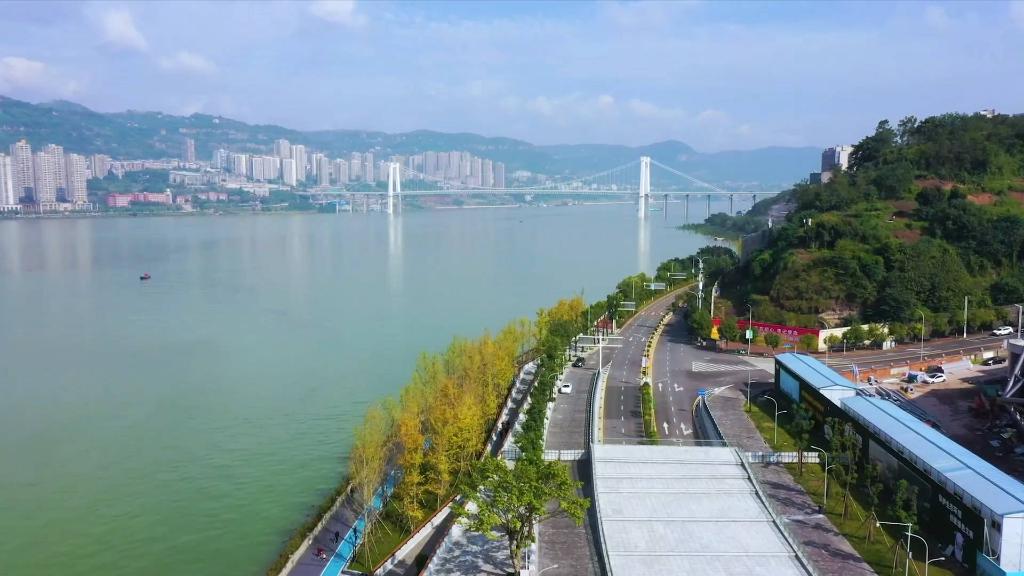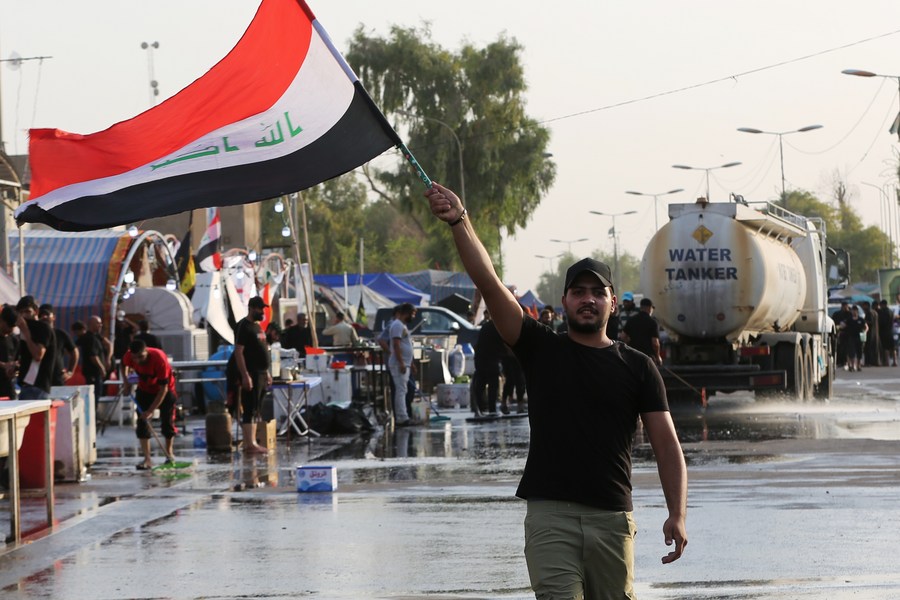
A protester wields an Iraqi flag during protests by followers of Shiite cleric Moqtada al-Sadr in Baghdad, Iraq on Aug. 8, 2022. Amid a protracted political stalemate in Iraq, the followers of powerful Shiite cleric Moqtada al-Sadr have vowed to continue holding protests in Baghdad until their demands for comprehensive reforms and anti-corruption fight are met. (Xinhua/Khalil Dawood)
BAGHDAD, Oct. 7 (Xinhua) -- The Iraqi political scene entered a new phase of conflict between the rival Shiite blocs after the controversial parliament session held on September 28, leaving the country in a prolonged impasse a year after the parliamentary elections on October 10, 2021, experts said.
Shiite cleric Moqtada al-Sadr and his rival Shiite leaders in the Coordination Framework (CF), an umbrella of pro-Iranian Shiite parties, are still clinging to their political positions.
Al-Sadr does not accept dialogue with his opponents unless they pledge to hold early elections and dissolve parliament, which the CF rejects.
The CF became the largest bloc in the Iraqi parliament after al-Sadr in June ordered his followers in the Sadrist movement, the biggest winner of the October elections with 73 seats, to withdraw from the parliament.
The September 28 session angered al-Sadr followers, prompting thousands of them to try to storm the Green Zone, which houses the parliament and other main government headquarters, but were blocked by the security forces, leaving more than 133 injured.
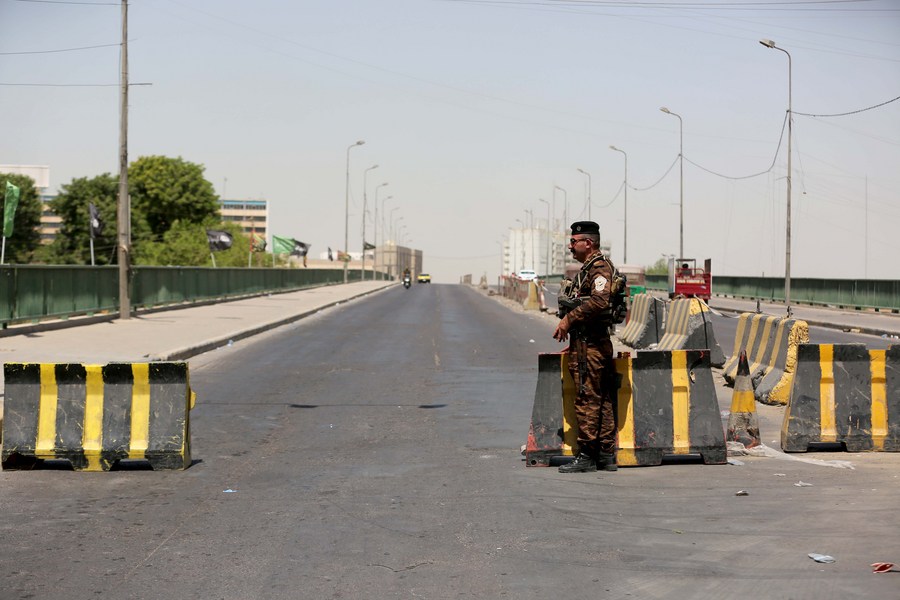
A security member stands guard at a checkpoint in Baghdad, Iraq, Aug. 30, 2022. (Photo by Khalil Dawood/Xinhua)
Nadhum Abdullah al-Jubouri, a political analyst in Salahuddin province, said that holding the latest parliament session and the renewal of confidence in Parliament Speaker Mohammed al-Halbousi by the CF lawmakers was a shock to the Sadrist movement.
"The session marked a new phase of the conflict between al-Sadr and the CF's parties, and turned it into a battle of breaking wills between the two sides," he added.
The extreme intransigence and failure to reach tangible solutions in the political process in Iraq are primarily attributed to the lack of trust that is clearly reflected in the positions of the CF parties and the Sadrist movement, he noted.
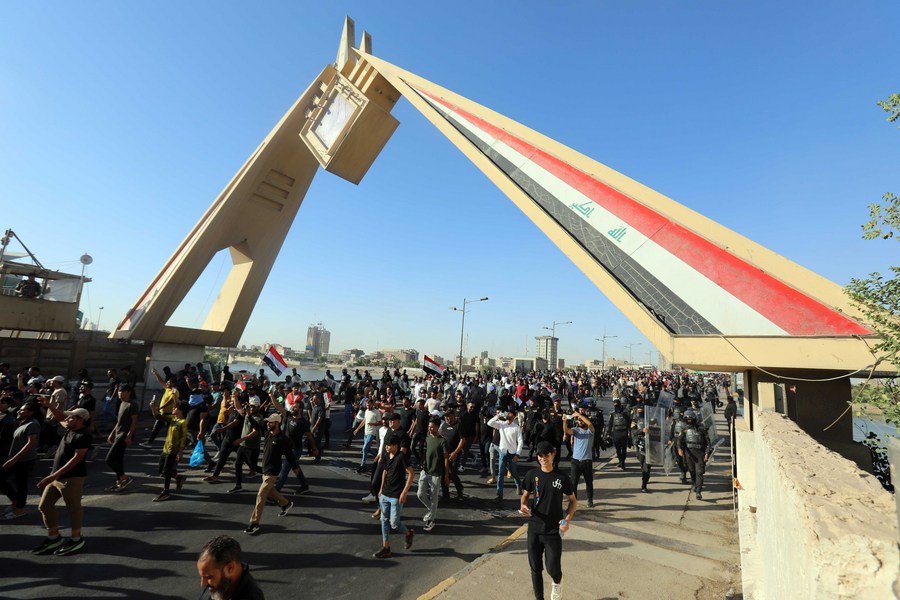
Followers of Shiite cleric Moqtada al-Sadr head towards the heavily fortified Green Zone in Baghdad, Iraq, July 27, 2022. (Xinhua/Khalil Dawood)
Najib Khalaf, a professor of Law at al-Iraqia University, told Xinhua "the September 28 session is a success for the CF's hardliners, but if a government is formed without the participation of the Sadrist movement, large-scale protests will possibly return in the country."
"Excluding the real October 10 elections' winners (Sadrists) in the government formation will not bring political, economic, and social stability to Iraq, and will open the door to political conflicts that may lead to violence and chaos in the country," he added.
Yaser al-Jubouri, a member of the Baghdad-based Political and Governance Development Academy, told Xinhua that the reconvene of the parliament is a sign that the formation of a new government is close.
"I think a new government will be passed by the lawmakers, but there must be a price such as concessions by the Shiite CF parties to Kurdish and Sunni parties," al-Jubouri said.
Even if the CF succeeds in forming a government, it will not last long because it will face great difficulties, especially the Sadrists' protests. He concluded that the best scenario for the CF is to negotiate with the Sadrist movement to form a new government.
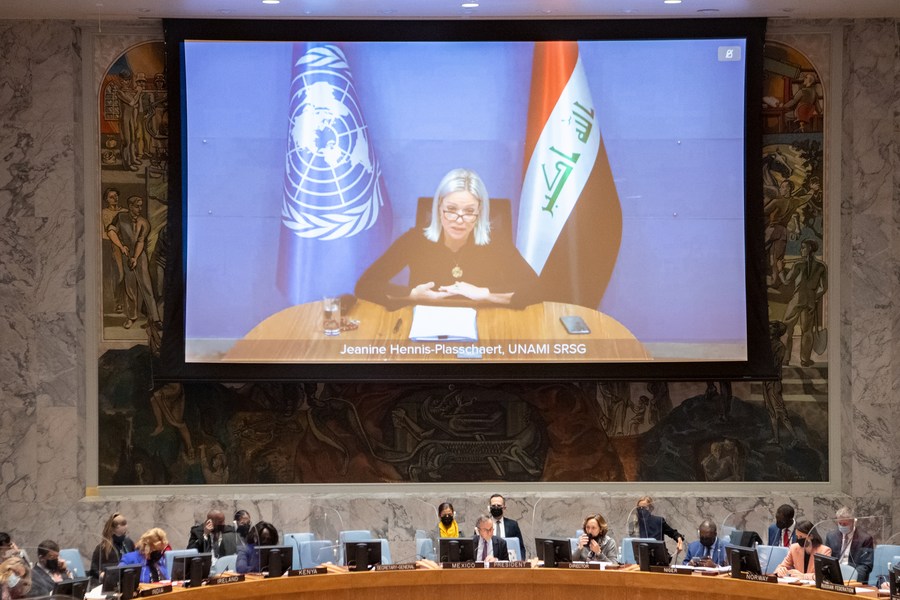
Jeanine Hennis-Plasschaert (on screen), the UN secretary-general's special representative and head of the UN Assistance Mission for Iraq, briefs the Security Council at UN Headquarters in New York on Nov. 23, 2021, on the situation in Iraq via video link from Baghdad. The top UN envoy for Iraq, Jeanine Hennis-Plasschaert, on Tuesday warned of a precarious post-electoral situation in Iraq and called for early government formation. (Eskinder Debebe/UN Photo/Handout via Xinhua)
Jeanine Hennis-Plasschaert, the Special Representative of the United Nations (UN) Secretary-General for Iraq, blamed the Iraqi political parties on the ongoing political differences that hampered the formation of a functioning government in her briefing on Tuesday to the UN Security Council.
"Actors across the spectrum failed to place the national interest first. They left the country in a prolonged impasse, further fuelling already simmering anger," Hennis-Plasschaert said.
"The persistent and overt lack of trust perpetuates a zero-sum game, a game in which commitment to concrete solutions is being avoided," she added. ■







